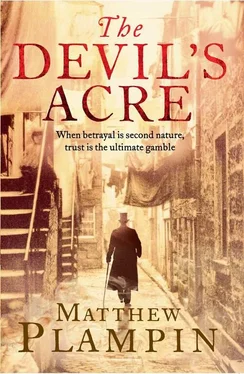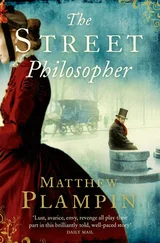There was a row of chairs against one wall, but as Colonel Colt showed no inclination to sit Edward felt it best that he remain on his feet as well. The two men removed their hats, and for the first time that day Edward was able to take a proper look at his employer. The Colonel must have been about forty, fifteen years older than Edward himself. He stood in the centre of the vestibule with his feet placed apart like a Yankee Henry VIII; he also shared the famous king’s imposing, barrel-chested build, and had the same small, sharp features set into a broad expanse of face. This was combined in Colt with the mottled, scarlet-shot complexion of the serious drinker, a reddish, close-trimmed beard and a head of dense brown curls which a generous lashing of hair oil had done little to order. His clothes were all the very best, and new. The bottle-green coat he wore was square-cut at the bottom in the American fashion, and had a lining of thick black fur which evoked something of his enormous, untamed homeland; of bears and buffalo, of great snowcapped mountains and rolling plains, of gold-panning and Red Indians; a place of fortune-seeking and wild adventure, very far indeed from the mud and grit of grey London.
Colt started to shake his head slowly, his mouth forming the beginnings of a scowl. They had done astonishingly well, in Edward’s opinion, but the Colonel was clearly far from pleased. Adjusting the case beneath his arm – it was rather heavy, in truth – he asked if anything was amiss. The gun-maker took what appeared to be a twist of tarred rope from his coat pocket, along with a small clasp-knife. Opening the blade, he cut off a piece about the size of a thumbnail and pushed it inside his lower lip. It was chewing tobacco, Edward realised, the great Yankee vice.
‘I know Paget of old, Mr Lowry,’ he muttered, his jaw working away ill-temperedly. ‘This’ll come to nothing.’
Lord Clarence Paget was in the later part of middle age, long-limbed and plainly dressed with a large, squareish forehead. He was seated behind a desk, finishing off a letter with a fastidious air. His office had two wide windows that looked out over the treetops of the Mall and St James’s Park; the branches, bare a fortnight earlier, were now dusted with budding leaves. The room was sparsely furnished – just a white marble fireplace, a couple of chairs and some mahogany bookcases – but it was packed with evidence of the work conducted within it. Framed prints of artillery pieces lined the walls, mechanisms from a multiplicity of firearms were arranged along the mantelpiece and the bookshelves, and scale models of cannon stood upon the desk, weighting down piles of official-looking documents and incomprehensible technical sketches.
Paget did not stop writing as they entered. ‘You have forced this conference upon me, Colonel, so you must forgive my ignorance of what brings you here today. I don’t claim to know how things are conducted in America, but in Great Britain it is customary to write first and arrange a meeting time that is convenient for both parties.’
‘Guns, Paget.’ Colt drawled out the name, biting off its end – Paa-jit – a pronunciation that had a distinctly belittling effect. The man’s high birth clearly meant nothing to him at all. ‘That’s what brings me here. What else could it be?’ He took a seat without waiting to be offered it, indicating that Edward should sit in the chair beside his. Then he extended a hand for the case, waving it over with a twitch of his fingers. ‘This here’s Mr Edward Lowry, my London secretary.’
Paget put a flourishing signature on his letter, scattered some sand on the ink and then laid down his pen, finally giving them his full attention. ‘Your London secretary, Colonel?’ he asked pointedly.
Colt did not answer. Instead, he flipped the catch on the front of the case and opened it up. He paused for a moment, an expert, showman-like touch; Edward caught a glimpse of mulberry velvet inside, fitted around a piece of polished walnut. Almost reverentially, the American gun-maker lifted out a revolving pistol, raising it before him for Paget to inspect.
Edward shifted slightly, feeling his pulse quicken. This was the closest he had yet come to one of the Colonel’s creations. It was a fine thing indeed, beautiful even, over a foot long with a sleek shape very different from the artless contraptions that cluttered Paget’s shelves. Some parts around the trigger had been cast in bright brass, but the main body of the weapon was steel, finished to a hard, lustrous blue so full and dark that it was close to black. An intricate pattern of leaves and vines had been pressed along the barrel, curling onwards into the corners of the frame; and a line of ships, sails full, cruised in formation around the cylinder.
‘The Navy,’ declared Colt with great satisfaction. ‘Named for the Texas Navy, my very first customers of any note, who used my guns to crush the Mexicans at Campeche. This here’s the third model, and the best by some distance. Thirty-six calibre – it’ll punch a hole clean through a door at five hundred yards.’
Paget regarded the gun for a moment or two and then looked back to his letter. Edward could scarcely believe it: he was unimpressed. ‘The British Government is perfectly aware of your revolvers, Colonel. I fail to see why this warranted my attention so urgently.’
The Colonel took this in his stride. ‘I’m showing you this particular piece, Mr Paget,’ he replied with heavy emphasis, ‘as it will serve as the mainstay of my Pimlico factory.’
This regained the official’s interest. His eyes flickered back up to his visitors. ‘I beg your pardon?’
‘What you see here is a Connecticut gun,’ Colt enlarged, chewing on his plug of tobacco, ‘hence these bits of brass, which I know John Bull has no taste for. Within the month, though, my premises down by the Thames will be turning out London Colts – pistols made by English hands, and from English materials. The machinery employed is of my own invention, and fully patented; the system of labour is entirely unique; and the combination of the two will lead to a gun factory without equal in the civilised world. Certainly nothing this country has at present comes close. It’ll be able to produce hundreds upon hundreds of these peerless arms,’ here he raised up the Navy once again, rotating his thick wrist to give a complete view, ‘in the blink of an eye – fast enough to meet any order your Queen might see fit to place. And you can be sure that my prices will reflect this ease of production.’ Colt sat back, adding carelessly, ‘Bessborough Place is the address.’
Edward had seen this factory. It had been the site of his first meeting with the Colonel, in fact, when he’d won his position with some assured talk of past dealings with the steel-men of Sheffield – and a spot of bluster about how deeply impressed he’d been by the Colt stand in the Great Exhibition two years before. His enduring memory of the pistol works itself was of the machine floor, a large, open area occupied by Colonel Colt’s renowned devices, smelling strongly of grease and raw, unfinished metal. These machines had a functional ugliness; spindly limbs, drill-bits and elaborate clamps were mounted upon frames in arrangements of mystifying, asymmetrical complexity. Everywhere, laid out across the floor like giant tendons, were the canvas belts that would eventually link the machines to the factory’s engine, via the long brass cylinder that hung in the centre of the machine-room’s ceiling. A handful of engineers had been attempting to connect one of these belts to the cylinder, cursing as it slipped free and fell away. Edward had overheard enough of their conversation to realise that they were encountering some serious problems in setting up the works. Colt’s sweeping claims to Paget were therefore largely false – but the secretary nodded in support of them nonetheless.
Читать дальше












